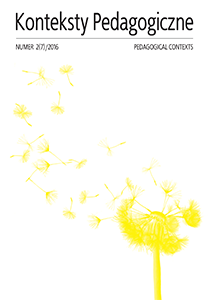Abstrakt
Warunkiem odniesienia sukcesu w każdej dziedzinie ludzkiego działania, także w uczeniu się, jest posiadanie dużej motywacji. Odwołując się do założeń teorii autodeterminacji E. Deciego i R. Ryana, można powiedzieć, że wspierające otoczenie społeczne może znacząco podnieść poziom motywacji ucznia, głównie poprzez organizowanie warunków umożliwiających zaspokojenie jego trzech naturalnych potrzeb: autonomii, poczucia kompetencji i związków z innymi. W artykule zaprezentowano wyniki badań doświadczeń uczniów na-uczania początkowego w zakresie edukacyjnych źródeł motywacji do uczenia się.
Bibliografia
Bee H., Psychologia rozwoju człowieka, przeł. A. Wojciechowski, Poznań 2004.
Brophy J., Motywowanie uczniów do nauki, przeł. K. Kruszewski, Warszawa 2002.
Brzezińska A., Jak skutecznie wspomagać rozwój?, [w:] Portrety psychologiczne człowieka. Podręcznik praktycznej psychologii rozwoju, red. A.I. Brzezińska, Gdańsk 2005.
Deci E.L., Vansteenkiste M., Self-determination theory and basic need satisfaction: un-derstanding human development in positive psychology, „Ricerche di Psicologia” 2004, nr 27 (1).
Deci E.L, Ryan R.M., A motivational approach to self: Integration in personality, [w:] Ne-braska symposium on motivation: Perspectives on motivation, t. 38, red. R.D. Dienst-bier,Nebraska 1990.
Deci E.L., Ryan R.M., Self-determination theory and the facilitation of intrinsic moti-vation, social development, and well-being, „American Psychologist” 2000, nr 55. Deci E.L, Ryan R.M., The “what” and “why” of goal pursuits: human needs and the self--determination of behavior, „Psychological Inquiry” 2000, nr 11.
Gagne M., Deci E.L., Self-determination theory and work motivation,„Journal of Orga-nizational Behavior” 2005, nr 26, s. 331–362.
Głoskowska-Sołdatow M., O „lepszej” i „gorszej” motywacji do uczenia się,„Dyrektor Szkoły” 2011, nr 12.
Grabinger R.S., Rich environments for active learning, [w:] Handbook of research for educational communications and technology,red. D. Jonassen, New York 1996.
Hart S., Hodson V.K., Empatyczna klasa. Relacje, które pomagają w nauce, Warszawa 2006.
Kern M., Planspiele im Internet,Wiesbaden 2003.
Małkiewicz E., Motywy poznania świata i uczenia się w kontekście podstawowych po-trzeb dziecka,[w:] Edukacja elementarna a diagnoza pedagogiczna,red. K. Sujak-Lesz, Warszawa 2002.
Michalak R., Dziecko u progu edukacji przedmiotowej. Studium teoretyczno-empiryczne, Poznań 2013.
Misiorna E., Michalak R., Ocenianie jako mechanizm wspierania rozwoju dziecka. Mit czy rzeczywistość,[w:] Dziecko w szkolnej rzeczywistości. Założony a rzeczywisty obraz edukacji elementarnej, red. H. Sowińska, Poznań 2010.
Reid J.-A., Forrestal P., Cook J., Uczenie się w małych grupach w klasie, przeł. E. Tro-czyńska, J. Troczyński,Warszawa 1996.
Schaffer H.R., Rozwój społeczny. Dzieciństwo i młodość, przeł. M. Białecka-Pikul, K. Si-kora, Kraków 2006.
Vallerand R., Bissonnette R., Intrinsic, extrinsic, and amotivational styles as predictors of behavior: a prospective study,„Journal of Personality” 1992, nr 60.
Autor zgodnie z zaleceniem MNiSW, by przeciwdziałać praktykom „ghostwriting” i „guest authorship” składając tekst dołącza oświadczenie Autora/Autorów, w którym deklaruje wkład każdego z Autorów w powstawanie publikacji. Własnoręcznie podpisane oświadczenie należy przesłać na adres redakcji:
Joanna Skibska | w formie skanu przesłać poprzez system OJS (biblioteka wydawcy).
Autorzy nie ponoszą żadnych kosztów w związku z publikacją artykułu na łamach czasopisma Konteksty Pedagogiczne oraz nie otrzymują gratyfikacji finansowej za opublikowanie tekstu. Redakcja zastrzega sobie prawo do wprowadzania niewielkich zmian w artykułach, które nie mają wpływu na merytoryczną stronę publikacji.
Autor (Autorzy) artykułu oświadcza, że przesłane opracowanie nie narusza praw autorskich osób trzecich. Wyraża zgodę na poddanie artykułu procedurze recenzji oraz dokonanie zmian redakcyjnych. Przenosi nieodpłatnie na Wydawnictwo Libron autorskie prawa majątkowe do utworu na polach eksploatacji wymienionych w art. 50 Ustawy z dnia 4 lutego 1994 r. o prawie autorskim i prawach pokrewnych – pod warunkiem, że praca została zaakceptowana do publikacji i opublikowana.
Wydawnictwo Libron posiada autorskie prawa majątkowe do wszystkich treści czasopisma. Zamieszczenie tekstu artykuły w repozytorium, na stronie domowej autora lub na innej stronie jest dozwolone o ile nie wiąże się z pozyskiwaniem korzyści majątkowych, a tekst wyposażony będzie w informacje źródłowe (w tym również tytuł, rok, numer i adres internetowy czasopisma).
Tekst jest udostępniany w internecie na licencji CC-BY-SA

